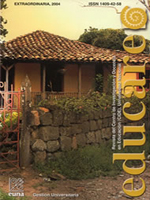Sistematización de una experiencia, evaluando para mejorar. Gestión de proyectos
DOI:
https://doi.org/10.15359/ree.2004-Ext.7Abstract
Analysis of several theoretical and practical elements used in project evaluation. This reflection is based on experiences within the university. A series of dimensions of analysis and guidelines for their operation are offered within the framework of a flexible evaluation model. Also, additional strategies are suggested in order to increase project evaluation precision. Some of the strategies refer to information management and rules to be followed by evaluators and those being evaluated.
References
Autoevaluación del Proyecto "Capacitación para el Desarrollo Regional
Sostenible". Período 1999-2002.
Convenio de Cooperación celebrado entre la UNA-COSTA RICA y la
University of Regina. Regina, Saskatchewan, Canadá.
Descripción del Proyecto "Capacitación para el Desarrollo Regional".
Formulación del Proyecto UNA-REGINA ante la Dirección de Docencia y
Dirección de Extensión. Universidad Nacional, Campus Ornar Dengo,
Heredia, 1998.
Hemández, C. y Aguilar, G. Evaluación Concurrente. Revista Imágenes.
Dirección de Extensión ,Universidad Nacional, Heredia, Costa Rica. 2003.
Minutas de la Comisión Evaluadora del Proyecto UNA-REGINA, de la Nº
-2002 a la Nº 13-2002.
Mujica, M. (2001). Evaluación del progreso del Proyecto, a medio período. Informe Final.
Nirenberg, O. et al. (2000). Evaluar para la transformación. Innovaciones en la evaluación de programas y proyectos sociales. Buenos Aires, Argentina. Paidos,
POAI' de los años 2000, 2001 y 2002 de la Escuela de Sociología.
Pacheco, J. F. DPPI, ILPES. Métodos para resolver problemas.
Sancho, F. Documento borrador sobre Evaluación del Desempeño.
Stufflebeam (1991). Diccionario Crítico de Ciencias Sociales. Metaevalaución.
Published
How to Cite
Issue
Section
License
1. In case the submitted paper is accepted for publication, the author(s) FREELY, COSTLESS, EXCLUSIVELY AND FOR AN INDEFINITE TERM transfer copyrights and patrimonial rights to Universidad Nacional (UNA, Costa Rica). For more details check the Originality Statement and Copyright Transfer Agreement
2. REUTILIZATION RIGHTS: UNA authorizes authors to use, for any purpose (among them selfarchiving or autoarchiving) and to publish in the Internet in any electronic site, the paper´'s final version, both approved and published (post print), as long as it is done with a non commercial purpose, does not generate derivates without previous consentment and recognizes both publisher's name and authorship.
3. The submission and possible publication of the paper in the Educare Electronic Journal is ruled by the Journal’s editorial policies, the institutional rules of Universidad Nacional and the laws of the Republic of Costa Rica. Additionally, any possible difference of opinion or future dispute shall be settled in accordance with the mechanisms of Alternative Dispute Resolution and the Costa Rican Jurisdiction.
4. In all cases, it is understood that the opinions issued are those of the authors and do not necessarily reflect the position and opinion of Educare, CIDE or Universidad Nacional, Costa Rica. It is also understood that, in the exercise of academic freedom, the authors have carried out a rogorous scientific-academic process of research, reflection and argumentation thar lays within the thematic scope of interest of the Journal.
5. The papers published by Educare Electronic Journal use a Creative Commons License:














 The articles published by Educare Electronic Journal can be shared with a Creative Commons License:
The articles published by Educare Electronic Journal can be shared with a Creative Commons License: 



